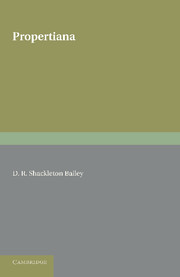Summary
Callimachi manes et Coi sacra Philitae, in uestrum, quaeso, me sinite ire nemus.
I sacra] fata Baehrens consors umbra FonteinThree lengthy discussions of sacra have appeared since BB.'s edition,1 written, like all else in this ancient debate, without awareness of Gell. 10. 18. 5 id monumentum Artemisia cum dis manibus sacris Mausoli dicaret and Carm. Epigr. 579. 1 hoc monumentum… manibus addictum sacrisque priorum; passages which I take to prove (a) that sacra in combination with manes is unlikely to be corrupt, and (b) that the word has nothing to do with poetry. So Sandbach's ‘poesy of Coan Philetas’ (after Hertzberg), Enk's ‘ “pars melior” poetae qua immortalis est’ and Alfonsi's ‘consecrazione poetica’ go overboard. Doubt may remain whether sacra in all three cases is virtually synonymous with manes (so Postgate; cf. for the hendiadys Virg. Aen. 2. 293 sacra suosque… Penatis, ibid. 320 sacra… uictosque deos) or, as understood by BB. and others, the rites paid to the dead (Serv. Aen. 10. 519 inferiae sunt sacra mortuorum); but failing any corroboration for the first meaning it is best to be content with the second, particularly as the two parallels I have cited strongly suggest that nemus is not a mere ‘poetic grove’ but ‘a consecrated grove, where worship is offered to the shades of the two poets’ (BB.). Objections to this view are not cogent. We do not know that such worship was really paid to Callimachus or Philetas, but, equally, we do not know that it was not; and Propertius may in any case have taken it for granted. Homer was so honoured: Varro ap. Gell. 3. 11.6 capella Homeri Candida haec tumulum indicat, / quod hac Ietae mortuo faciunt sacra. There is, perhaps, as Housman contended, some lack of logic in appealing to ‘rites’, as well as ‘spirits’, for permission to enter; but it is now evident that manes et sacra was a stereotyped expression, and Propertius probably used it (both words applying to both poets) without close analysis as covering everything that needed propitiation.
- Type
- Chapter
- Information
- Propertiana , pp. 135 - 215Publisher: Cambridge University PressPrint publication year: 2014



